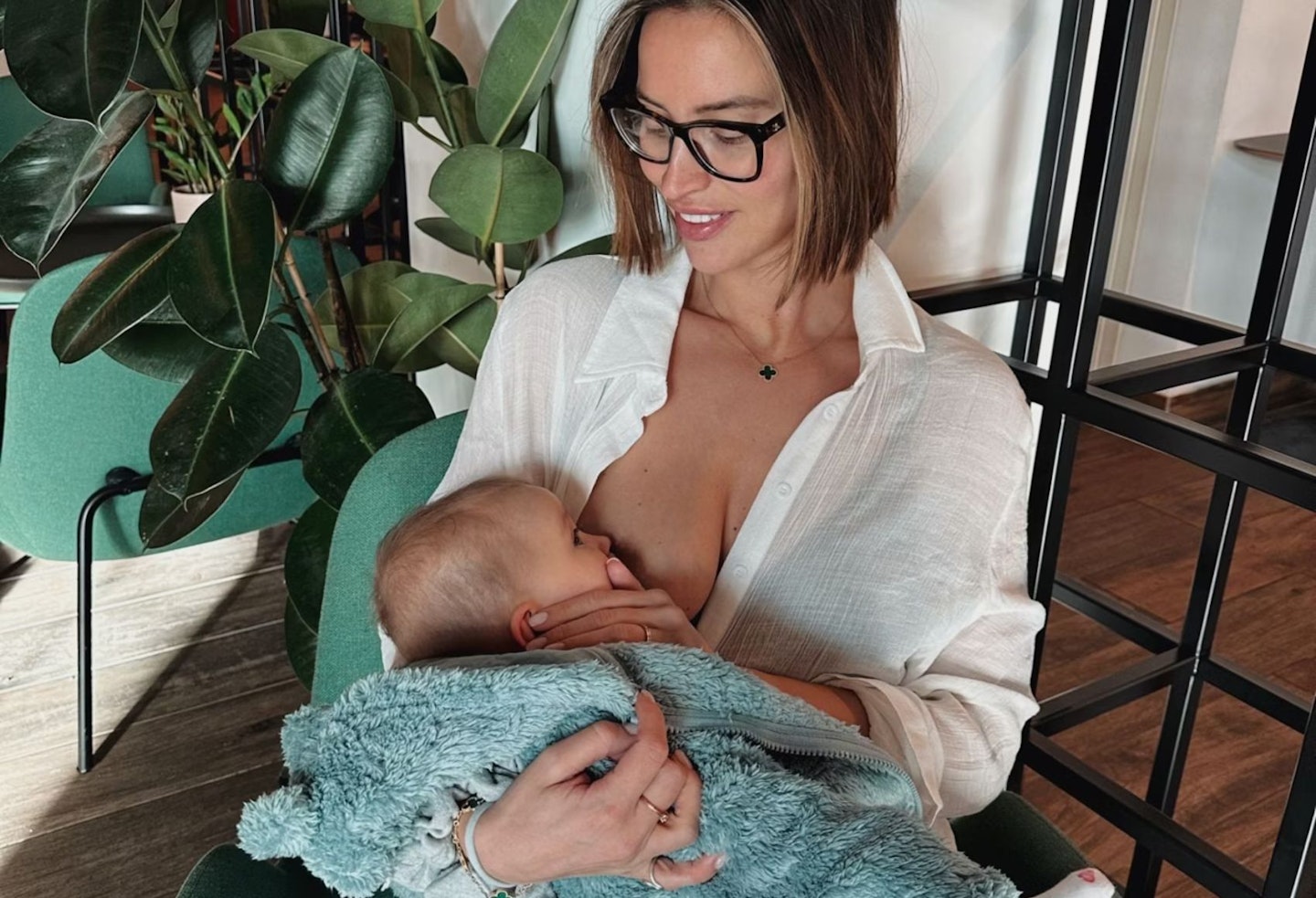Let’s be honest—breastfeeding in public can feel a little nerve-wracking, especially if you’re new to it. The thought of finding the right spot, wearing something practical, or worrying about people staring can make you want to stay home. But it doesn’t have to be that way!
Did you know that the UK has some of the lowest breastfeeding rates in the world? According to a report by UNICEF UK, eight out of ten women stop breastfeeding before they’d like to. I can relate—I’ve been there myself. So, why is it so challenging?
A big part of the problem is the pressure and judgment mums face. According to a Start4Life poll, 1 in 10 women who chose not to breastfeed said the fear of breastfeeding in public influenced their decision. And in another survey, one in five mums reported being called out for breastfeeding in public—yes, really.
Whether it’s in a park, on a bus, or just out and about, the criticism can be relentless. Even reality TV star Ferne McCann, who you’d think could brush off the haters, has faced it herself.
“Breastfeeding in public was quite nerve-wracking for me, especially at first. I vividly remember breastfeeding Finty in public for the first time and feeling overwhelmed. But as I became more comfortable, so did those around me."

So just like Ferne with a bit of planning, some practice, and the right support, you’ll soon feel comfortable feeding your baby wherever you need to.
To help make it easier, we’ve chatted with two amazing experts: midwife and lactation consultant Anna Cannon, and The Eco Midwife Angie Willis (in partnership with MAM). Here they shared their best tips, tricks, and words of encouragement so you can breastfeed in public with confidence and ease.
Know your rights
First things first, let’s clear up any doubts. Here in the UK, it’s illegal for anyone to ask a breastfeeding mum to leave a public place. Thanks to the Equality Act 2010, you can breastfeed in cafés, parks, shops, cinemas, public transport—basically anywhere you like.
If someone stares, you don’t owe them an explanation. Just smile, focus on your baby, and remind yourself that you’re doing something completely natural and protected by law.

Expert-approved tips on how to breastfeed in public with confidence
1. Location, location, location
The first step is finding a place where you feel comfortable. It’s not about hiding away, but it helps to choose a relaxed environment. Start with places where you feel safe and at ease, such as a local NCT meeting, a friendly café, or your local park. You’re less likely to feel self-conscious if you have someone with you, like a friend, partner, or family member.
"It’s really important to remember that you never need to retreat to the toilet for a private feed," says Anna Cannon, a midwife and International Board Certified Lactation Consultant. "Just act as you normally would—if you want to sit in your favourite café window seat, then go for it."
2. Perfect breastfeeding outfits
Breastfeeding clothes come in all shapes and styles, but what you wear is ultimately about comfort and practicality. Some mums prefer loose tops that can be lifted easily, while others like wearing two stretchy tops—one that lifts up and another that can be pulled down.
"You may find your maternity tops can still work," says Anna. "You can fit your baby underneath, close to your skin, for an easy feed."
3. Practice at home
The first time you breastfeed in public can be nerve-wracking, but practicing at home can help. "What you see when you look down is different from what someone sitting across from you sees," Anna points out. "Try nursing in front of a mirror while dressed in the clothes you plan to wear out to get used to how to cover up or latch on discreetly."
4. Lean back for extra confidence
If your baby tends to 'pop off' the nipple frequently, try leaning back slightly. "This will help your baby slope toward you, so if they pop off, their head still blocks the view," says Anna. "Leaning back also uses gravity, making it easier to keep them latched on."
5. Slings and cover-ups
Some mums like to breastfeed while their baby is in a sling, as it can provide extra coverage while still allowing you to see your baby. "You can pull the sling higher to cover your baby’s head," suggests Anna. "Alternatively, a muslin cloth laid across your chest can act as a discreet cover."
6. Be prepared for anything
Always pack your breastfeeding essentials in your baby’s changing bag before heading out. Breast pads, a muslin, and a spare top can save you from any unexpected mishaps.
"Don’t worry if something goes wrong—whether it's a nipple slip or a breast pad falling out of your bag," says Anna. "The key is to laugh it off!"
7. Use discreet feeding positions
"If you'd prefer people not to know you're breastfeeding, try a ‘camouflage’ position," suggests Anna. "The cradle hold, where your baby faces your breast, looks like you're just cuddling."
8. Responsive feeding
"Don’t worry about how long your baby feeds when you're out and about," Anna says. "Sometimes they just need a quick top-up, and that’s fine!"
9. Express milk for on-the-go feeding
"Once your milk supply is established, you can express milk to feed your baby while you're out," Anna suggests. "The best time to express is first thing in the morning."
10. Be aware of cold weather
"Some medications can affect milk production, so always check with your pharmacist if you're using anything while breastfeeding," says Anna. "Cold weather can also make your nipples sensitive—so dress warmly and use heat pads if needed."

Overcoming the common callenges of breastfeeding in public
"The most common problems mothers face when breastfeeding in public include where to sit comfortably and how to feel good about what they’re wearing," says Angie Willis, The Eco Midwife (in partnership with MAM) and breastfeeding advocate. "But the biggest anxiety is the fear of receiving negative comments. A recent MAM survey showed that nearly 47% of breastfeeding mothers report receiving disapproval from onlookers."
What are the emotional struggles?
"Many mothers feel uncomfortable breastfeeding in public because of the possibility of negative reactions," says Angie. "The fear of someone saying something can be enough to make women stop breastfeeding in public altogether."
"About 39% of European mothers report discomfort while breastfeeding in public, and nearly 37% seek out private spaces," she adds. "This discomfort sometimes leads to women opting for formula feeding or expressing milk, as it feels more convenient or less stressful."
How can mums overcome these emotions?
"One great way to overcome anxiety is to join a breastfeeding group during pregnancy," suggests Angie. "Talking to other mums about their experiences can help you see that you're not alone."
"Take a friend with you when you first breastfeed in public for moral support," Angie says. "It helped me when I took my sister along on my first outing with my baby."
She also highlights the importance of breastfeeding-friendly environments: "Some cafes and stores have ‘breastfeeding welcome’ signs. These places offer a reassurance that you're supported and won’t face negativity."

How can the community support breastfeeding mums?
"If you see a woman breastfeeding in public, support her!" Angie urges. "Offer a seat, a drink of water, or simply tell her she’s doing great. Sometimes a ‘thank you for breastfeeding in public’ card can be a huge confidence boost."
She adds, "It’s so helpful when other women share their breastfeeding stories. It can help mums relax knowing there’s an ally in the room."
Breastfeeding in public is a right, not a privilege. With the right support, confidence, and knowledge, you can feed your baby anywhere. Angie’s advice? "The more women breastfeed in public, the more normal it becomes in society, and the easier it will be for future mums."
*Survey of 5,476 mums conducted by MAM across 13 countries – Austria, Germany, Switzerland, UK, Denmark, Norway, Sweden, Spain, Portugal, Italy, Hungary, France and Greece.
About the expert
Anna Canon is a midwife and an International Board Certified Lactation Consultant with Breastfeeding London.
Angie Willis aka The Eco Midwife has been a midwife for eight years and has worked across different areas supporting women in those years. She's also a Health Visitor and has undertaken training n maternal mental health and aromatherapy.
About the author
Anne Lora Scagliusi is a Senior Digital Writer at Mother & Baby. She is a Scotland-based journalist with over a decade of international writing experience, specialising in women’s health, maternal mental health, and wellness. Her work has been featured in Vanity Fair, Marie Claire, and Glamour and has appeared on several Vogue global editions. She is mum to a one-year-old bambino and lives between Italy and the UK.
